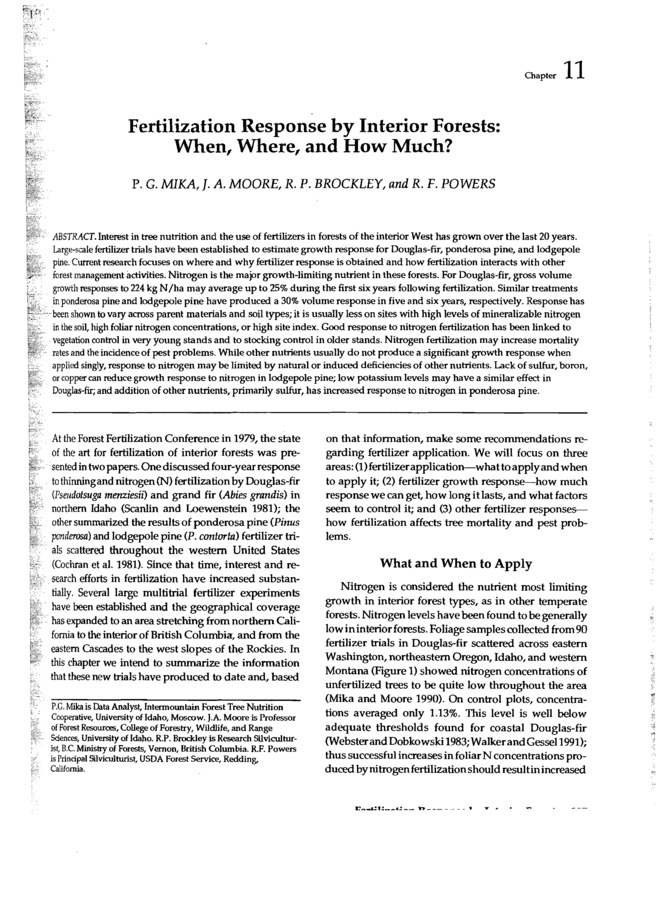PDF
Fertilization Response by Interior Forests: When, Where, and How Much? Item Info
- Title:
- Fertilization Response by Interior Forests: When, Where, and How Much?
- Creator:
- Mika, P.G.; Moore, J.A.; Brockley, R.P.; Powers, R.F.
- Date Created (ISO Standard):
- 1992
- Description:
- Interest in tree nutrition and the use of fertilizers in forests of the interior West has grown over the last 20 years. Large-scale fertilizer trials have been established to estimate growth response for Douglas-fir, ponderosa pine, and lodgepole pine. Current research focuses on where and why fertilizer response is obtained and how fertilization interacts with other forest management activities. Nitrogen is the major growth-limiting nutrient in these forests. For Douglas-fir, gross volume growth responses to 224 kg N /ha may average up to 25% during the first six years following fertilization. Similar treatments in ponderosa pine and lodgepole pine have produced a 30% volume response in five and six years, respectively. Response has been shown to vary across parent materials and soil types; it is usually less on sites with high levels of mineralizable nitrogen in the soil, high foliar nitrogen concentrations, or high site index. Good response to nitrogen fertilization has been linked to vegetation control in very young stands and to stocking control in older stands. Nitrogen fertilization may increase mortality rates and the incidence of pest problems. While other nutrients usually do not produce a significant growth response when applied singly, response to nitrogen may be limited by natural or induced deficiencies of other nutrients. Lack of sulfur, boron, or copper can reduce growth response to nitrogen in lodgepole pine; low potassium levels may have a similar effect in Douglas-fir; and addition of other nutrients, primarily sulfur, has increased response to nitrogen in ponderosa pine.
- Location:
- North and Central Idaho; Eastern Washington; Western Montana; Northeastern Oregon
- Publisher:
- Intermountain Forest Tree Nutrition Cooperative, University of Idaho, College of Forest, Wildlife and Range Sciences, Moscow
- Source:
- Mika, P.G., J.A. Moore, R.P. Brockley, and R.F. Powers. 1992. Fertilization Response by Interior Forests: When, Where, and How Much? Ch 11 p. 127-142 In Chappell, H.N., G.F. Weetman, R.E. Miller. 1992. Forest Fertilization: Sustaining and Improving Nutrition and Growth of Western Forests. For. Res., Univ. of Washington, Seattle. Inst. of For. Res. Cont. No. 73.
- Source Identifier:
- Fertlization_Response_by_Interior_Forests_When_Where_and_How_Much_IFTNC_1992
- Type:
- Text
- Format:
- application/pdf
Source
- Preferred Citation:
- "Fertilization Response by Interior Forests: When, Where, and How Much?", Idaho Forestry Research Collection, University of Idaho Library Digital Collections, https://www.lib.uidaho.edu/digital/forestryresearch/items/forestryresearch875.html
Rights
- Rights:
- Educational use includes non-commercial use of text and images in materials for teaching and research purposes. Digital reproduction rights granted by University of Idaho Library. For other uses beyond educational use, please contact University of Idaho Library Special Collections and Archives Department at libspec@uidaho.edu.
- Standardized Rights:
- http://rightsstatements.org/vocab/InC-EDU/1.0/

